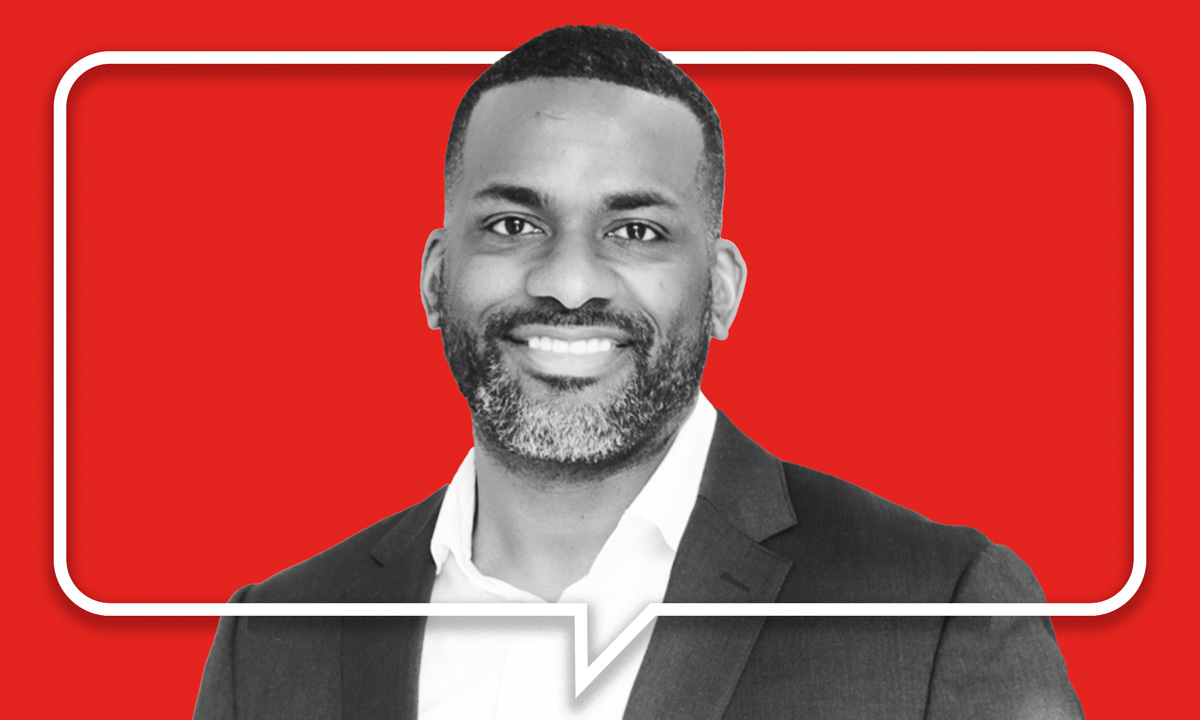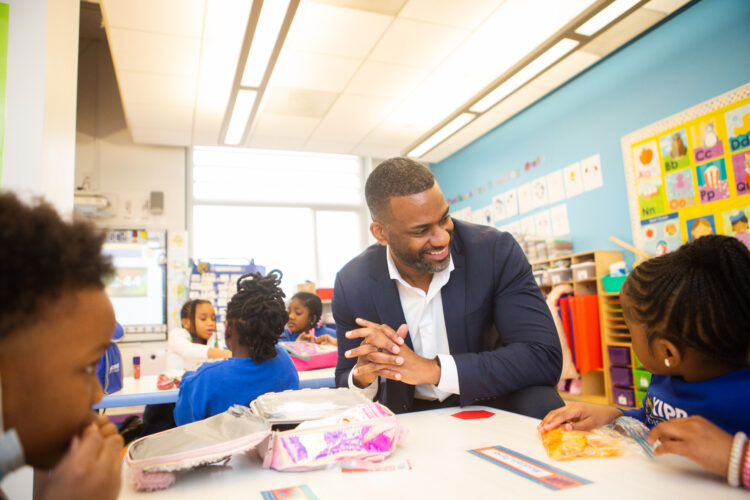74 Interview: New KIPP CEO Shavar Jeffries on Students’ Post-Pandemic Needs
Former head of Democrats for Education Reform discusses kids' well-being, Democratic politics and a Marshall Plan for recruiting teachers

Get stories like this delivered straight to your inbox. Sign up for The 74 Newsletter
See previous 74 Interviews: Educator Sal Khan on COVID’s staggering math toll; economist Tom Kane on the challenge of reversing learning loss; and education researcher Martin West on this fall’s NAEP results. The full archive is here.
A civil rights lawyer by trade and an education activist by avocation, Shavar Jeffries was thrust into the spotlight in early 2010 when he was elected to a school board seat in Newark. It was an era when odd political bedfellows Republican Gov. Chris Christie and Democratic Sen. Cory Booker showed up in Newark bearing a $100 million check from Facebook founder Mark Zuckerberg, to be spent on both charter and district-run schools.
On Jeffries’s watch, Newark’s schools posted historic gains — inviting gale-force political blowback that’s still reverberating.
He then embarked on an eight-year run as the head of Democrats for Education Reform and its nonprofit sister, Education Reform Now. He took the helm at a time when many Democrats were abandoning the centrist school-improvement policies of the Obama era, yet Jeffries — who is a distant cousin of U.S. House Minority Leader Hakeem Jeffries — coordinated dozens of winning political strategies.
Now, Jeffries is heading up the KIPP Foundation, which coordinates a coast-to-coast network of highly regarded public charter schools. His new job is to lead 280 schools — and affiliated groups tackling everything from increasing alumni college persistence rates to recruiting and training the next generation of education leaders — out of an unprecedented pandemic crisis.
The 74 caught up with Jeffries recently to hear what prompted him to move to KIPP, his advice about the Democrats’ education agenda and what he believes will meet young people’s needs at a critical juncture. This conversation has been edited for length and clarity.
The 74: How many people have hit you up in the last two months for a pipeline to your cousin?
Shavar Jeffries: A lot. It reminds me a little bit of when I was school board president in Newark. Every time I go into my LinkedIn, there’s somebody. So yeah, we’re getting a lot.
What advice do you have for Democrats who want to shepherd an education agenda?
We need more political infrastructure to support Democrats. There’s a heavily funded infrastructure to oppose charters within the Democratic Party. A lot of that is funded by our colleagues in the teacher unions, who we work with on many different issues.
There have to be more political assets made available to candidates and elected officials. As long as many Democrats feel like they have to put their political career on the line in support of an issue, we’re going to have challenges. Having said all that, we continue to get bipartisan support for the charter school program in Congress. President Biden has supported that, Roberto Rodriguez [U.S. Department of Education assistant secretary for planning, evaluation and policy development] has spoken publicly about that. Many of the communities with the largest charter school shares of enrollment are run by Democratic mayors and Democratic school boards.
Tell us about the impetus for your move to KIPP.
I’ve been a part of the KIPP family for 22 years. My children attended both KIPP elementary and middle schools. I’ve been on the KIPP national board for about five years. I love it. I love our mission. I just believe in our promise.
Really what motivated me was how profound the impact of a pandemic has been on our country from a student learning standpoint. When the results of the National Assessment of Educational Progress came out showing that throughout the country we lost about 30 years of gains, I was convinced to use the resources and talents I have in a way that will be even more directly connected to kids and to student outcomes.
KIPP is the largest public charter school network in the country, with 120,000 kids in 27 regions. We ought to be the model for the country in terms of how to deliver educational excellence and equity at scale.
Before COVID-19, a lot of research outlined how successful schools in networks like KIPP are with students from traditionally disadvantaged communities. The pandemic spared almost no one, though. What is the challenge for the high-quality charter sector right now?
Delivering academic good for kids, first and foremost. Given the pandemic, given school closures, given the disruption evidenced by the NAEP data and other data, all of us in public education — whether public charter schools or traditional public schools — we all have a lot of work to do to address unfinished learning, to support young people to obtain the skills, the competencies they need in order to fulfill their potential. That’s job one, as far as I’m concerned, for everybody in public education.
Throughout our network, when we’re sharing best practices, we’re able to deliver for young people. Most powerfully, we’ve seen this in our early literacy program. Several of our regions are working together to implement aligned, consistent [strategies] rooted in the science of literacy. We’ve already seen 28 percentage point gains in literacy rates for the [KIPP] regions participating in that program.
In high school, we see acute mental health challenges many young people are experiencing. In many places, we’re now seeing levels of violence in our communities coming to bear in our schools, so we’re pushing an aligned high school strategy focused on academic health, but mental health support as well.
We’re working on a middle school math [strategy]. And we’re focused on leadership. We have a principal pipeline program. We’re also excited to see the diversity throughout our organization. More than 60% of our school leaders are Black or Latinx. That’s three times the rate of what we see in public education broadly.

Policy wonks and researchers have floated lots of evidence-backed strategies for different aspects of pandemic recovery. But traditional school leaders often say, “Well, I can’t find the people.”
The teacher shortage is really a national challenge. We would love to see policymakers work with traditional public schools, public charter schools and a broad diversity of stakeholders who are committed to making sure that we have great teachers in every classroom. This is a macro-level problem, and we really need national leadership, a Marshall Plan-type level of engagement. This should be a call to arms that one of the most important things that any set of human beings can do is to go into our classrooms and educate our babies.
Similarly, there is a lot of talk about circumstance as a hurdle to student success, especially over the last three years. Many families’ circumstances are jaw-dropping. How should that inform our thinking going forward?
We have to be very clear that we’re equipping our young people with the skills and competencies they need to have a limitless future. That means we need to be unwavering in the idea that our kids are geniuses, they’re brilliant, they’re amazing. We need to hold them accountable to the hard work they need to invest in and we need to support them in. And then, the quality of teaching and learning so they actually obtain those skills.
Our children are dealing with very difficult circumstances. And most of the communities that we work in, they’ve been dealing with difficult circumstances for generations. Notwithstanding all the macro-level, political, social, economic work many of us are engaged in, they’re likely to be in difficult circumstances for the foreseeable future. Our job is to work within the reality that the challenges they face can actually be a source of strength and power. Some adversity that actually can make you stronger, right?
We have to be clear with all the adults who interface with our children that they do not need, or want, your pity. With the right expectations and the right practices, their challenges can be converted into energy to power them into their dreams. We have to be unwavering with the bar of what we expect students to be able to achieve. We have to make sure the adults are clear about that bar, and that we provide them the support, training and coaching they need to deliver against that bar, day in and day out.
Some people will talk about, “Just pull yourself up by your bootstraps and figure it out.” That is problematic. We have to make the investments that young people — and, frankly, adults — have the support that they need, and the coaching and training to recognize the greatness of our kids, to recognize that we have to support them as they’re dealing with very difficult and adverse circumstances.
Do you have fears about all this being subsumed by what feels like a societal inflection point?
It’s always been hard, right? When I was president of the Newark School Board, we dealt with a version of all of that. All kinds of misinformation, efforts to politicize the curriculum, to politicize accountability. We’ve been working to break cycles of poverty and the bonds of intergenerational racism for a long period of time. This work has always been challenging. In the current moment, there’s been many conversations around education, around equity and efforts by political figures to micromanage the curriculum. That’s obviously very concerning. Perhaps we’re seeing this play out in more uncomfortable ways than it has in the past.
We just want to continue to focus on children, to try to not get caught up in a partisan food fight, to really focus on what’s going to support students to love themselves, to recognize their culture and their identity as a source of power and a source of strength in order to fulfill their potential and change the world.
We’re going to ensure that student achievement and outcomes are the lodestar. And hope and hope that if we tell our story to enough of the right people, over a long enough period of time, more often than not, that’ll be good for kids.
Disclosure: Walton Family Foundation, the Bill & Melinda Gates Foundation and Charles and Lynn Schusterman Family Philanthropies provide financial support to KIPP and The 74.
Get stories like these delivered straight to your inbox. Sign up for The 74 Newsletter

;)
